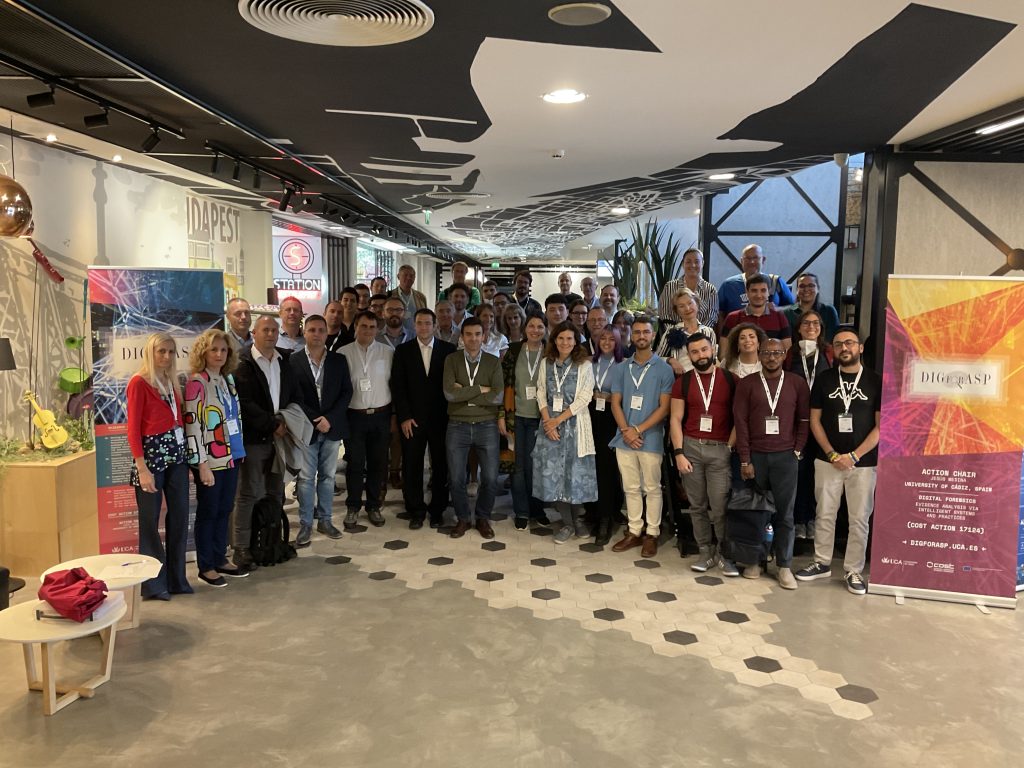TRAINING SCHOOL 2021

Training School on Digital forensics: evidence analysis via intelligent systems and practices
WHAT: Traning School
WHEN: 4-8 October, 2021
WHERE: Budapest (Hungary)

Venue: Mercure – Ibis Budapest Castle Hill
Location: https://goo.gl/maps/RpD2JwUYvy34kZT86
Download Group Photo: https://digforasp.uca.es/wp-content/uploads/2021/10/Group-Photo-BUDAPEST-1024×768.jpg
Description
Program of the Summer School
Place: Budapest (Hungary)
Venue: Mercure Budapest Castle Hill – Ibis Budapest Castle Hill
Monday
|
Tuesday
|
Wednesday
|
Thursday
|
Friday
|
You can consult the ESCIM2021 program in the following link: PROGRAM ESCIM2021
Short CV of the teachers
Nanni Bassetti
Dr. Nanni Bassetti has a degree in Computer Sciences got at University of Bari and is a digital forensics and cyber security consultant. He has collaborated as a freelancer with many national and international computer science magazines and he was teacher for many courses at institutions, schools and universities, he has also written two books about digital forensics and IT security. Founder of CFI – Computer Forensics Italy – the largest Italian computer forensics community and Secretary of ONIF an important Association dedicated to digital forensics. Project manager of Caine Linux Live Forensic Distro. Curator of the site https://github.com/nannib dedicated to software for computer forensics and others themes like machine learning and encryption.
Tania Cerasella
Graduated in Law from the Universitá degli Studi di Roma “La Sapienza”; casation lawyer at the Rome Bar; graduated in Vatican archival at the Schola Vaticana de Re Palaeographica diplomatica archivistica -Civitae Vaticana; member of the research group in neurobioethics (GDN) and member of the research neurolaw subgroup (GDN) a the Pontificical University Regina Apostolorum – Rome; speaker in the Neurobioethics specialization course “neurobioetica e transumanismo” 2017/2018 -edition I-Pontificical University Regina Apostolorum – Rome; speaker in the Neurobioethics specialization course “neurobioetica e roboetica” 2018/2019 -edition II-Pontificical University Regina Apostolorum – Rome; speaker in the Neurobioethics specialization course “neurobioetica e intelligenza artificiale” 2019/2020 -edition III-Pontificical University Regina Apostolorum – Rome; master lecturer in philosophical consultancy and existencial anthropology at Eutopean University in Rome -2020; author of the book “Profumo di vita (la gioia di donarse”)”, participation in numerous conferences as speaker,; participation in the Networking Congress organized by the “European Center for legal Cooperation”.
Emanuela Cesarella
New member of the Action and a lawyer in criminal filed at the Court of Rome. She is also the coordinator of the study and research of the sub-group of “Neurodiritto of the Neurobioethics” at Regina Apostolorum Pontifical University and the European University of Rome, directed by Prof. Father Alberto Carrara LC.
Stevan Gostojić
Prof. dr Stevan Gostojić holds a Ph.D. in electrical and computer engineering from University of Novi Sad. He is an associate professor of applied computer science and informatics at Faculty of Technical Sciences in Novi Sad and a court appointed IT expert witness. Stevan is the head of the Digital Forensics Laboratory at Faculty of Technical Sciences in Novi Sad founded to support teaching, research and provision of digital forensics services. He is a court appointed IT expert witness from 2014, mainly working as a digital forensics examiner in the fields of computer forensics, mobile forensics, and application forensics.
Raffaele Olivieri
Ph.D. in Information Engineering and Computer Science at the University of L’Aquila, and employed since 2001 in the Digital Forensics laboratory of Italian Carabinieri. I am one of the main proponents of the European Cost Action DigForASP CA17124 (“Digital forensics: evidence analysis via intelligent systems and practices”), aimed to study and develop new techniques based on Artificial Intelligence for Digital Forensics and Investigations as well as Leader of the “WG1: Digital Forensics requirement analysis” of the same Cost Action.
Mane Piperevski
Mane is an Experienced Information Technology Expert with extensive experience in Cyber Security. Over 17 years in IT industry and 12 years hands on experience in field of Cyber Security. With a breadth of technology skills, including networks, operating systems, databases and application development, Mane has provided penetration testing and Cyber forensics services in various industry sectors such as banking, electronic payment services, transportation, software development companies, utilities, insurance and state courts. As experienced trainer and instructor Mane has conducted training classes in IT security, EC-Council and Microsoft Products for over 1500 students. He is regular speaker at Cyber Security International Conferences and community events, leader and founder of OWASP Macedonian Chapter and author of valuable scientific papers (among which “Malware powered by IPv6 address” and “Methodology for Vulnerability Research and Exploit Development”).
Paolo Rosso
Paolo Rosso is full professor at the Universitat Politècnica de València, Spain. His research interests focus mainly on author profiling, irony detection, fake reviews detection, plagiarism detection, and recently hate speech and fake news detection. Since 2009 he has been involved in the organisation of PAN (a series of scientific events and shared tasks on digital text forensics and stylometry) benchmark activities at CLEF and at FIRE evaluation forums, mainly on author profiling and plagiarism/text reuse detection. This year, he is involved in the organisation of the PAN task on Profiling fake News Spreaders on Twitter. At SemEval he has been co-organiser of shared tasks on sentiment analysis of figurative language in Twitter (2015), and on multilingual detection of hate speech against immigrants and women in Twitter (2019). He is co-ordinator of the activities of the IberLEF evaluation forum. He is also involved in a project funded by Qatar National Research Fund on author profiling for cyber-security. He serves as deputy steering committee chair for the CLEF conference and as associate editor for the Information Processing & Management journal. He has been chair of *SEM-2015, and organisation chair of CERI-2012, CLEF-2013 and EACL-2017. He is the author of 400+ papers, published in journals, book chapters, conference and workshop proceedings. He gave several tutorials on plagiarism detection at ICON (2010), on author profiling and plagiarism detection at RuSSIR (2014), and on author profiling in social media at RANLP (2015), FIRE (2016) and CLiC-it (2018) addressing mainly age, gender, personality, and native language identification.
Andrii Shalaginov
Igor Kotsiuba
Dr. Igor Kotsiuba has served for more than a decade in industry and academia and has completed numerous transnational projects with leading players in Cybersecurity and Industrial IoT. Dr. Kotsiuba is a counsellor in government and industry and founder at cybersecurity agency iSolutions and established a digital forensics lab in Ukraine to build capacity and restore the rule of law in cyberspace. Igor is an evangelist of an inclusive approach to delivering full-stack cybersecurity managed services from initial compromise assessments to digital forensics evidence verifications. He has been advising Ukrainian Businesses and Governmental Institutions on Cybersecurity issues, In the year 2018 Igor Kotsiuba was elected as a Head of Cybersecurity Work Group at the American Chamber of Commerce Ukraine. Igor is an Of Counsel at Asters and supports their team in Brussels on ongoing Joint Activities in European Parliament.
Training School Committee
- Aleksandra Dedinec (coordinator)
- Andrii Shalaginov
- David Pearce
- Jesús Medina
- Pedro Cabalar
- Raffaele Olivieri
- Stefania Costantini
- Szilvia Nagy
Local Organizing Committee
- To be announced

